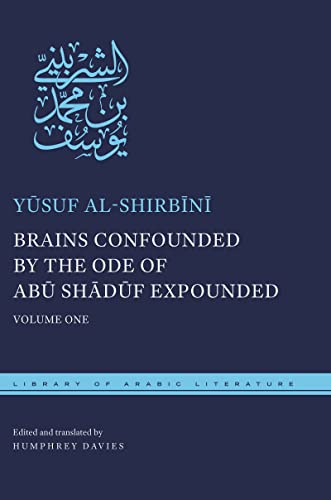
Al-Shirbini Yusuf, Brains Confounded by the Ode of Abu Shaduf Expounded: Volume One, Ed. and trans. by Humphrey Davies, NYU Press; Bilingual ed., 2016. [1686.]
excerpt
Unique in pre-20th-century Arabic literature for taking the countryside as its central theme, Yusuf al-Shirbini’s Brains Confounded combines a mordant satire on seventeenth-century Egyptian rural society with a hilarious parody of the verse-and-commentary genre so beloved by scholars of his day.
In Volume One, Al-Shirbini describes the three rural “types”—peasant cultivator, village man-of-religion and rural dervish—offering numerous anecdotes testifying to the ignorance, dirtiness, illiteracy, lack of proper religious understanding, and criminality of each. He follows it in Volume Two with a 47-line poem supposedly written by a peasant named Abu Shaduf, who charts the rise and fall of his fortunes and bewails, above all, the lack of access to delicious foods to which his poverty has condemned him. Wielding the scholarly tools of elite literature, al-Shirbini responds to the poem with derision and ridicule, dotting his satire of the ignorant rustic with numerous digressions into love, food, and flatulence.
Witty, bawdy, and vicious, Brains Confounded belongs to an unrecognized genre from an understudied period in Egypt’s Ottoman history, and is a work of outstanding importance for the study of pre-modern colloquial Egyptian Arabic, pitting the “coarse” rural masses against the “refined” and urbane in a contest for cultural and religious primacy, with a heavy emphasis on the writing of verse as a yardstick of social acceptability.
An unusual mini-masterwork from the
canon of bawdy, naughty, and perverted Arabic literature from the
18th century, featuring more pissing, shitting, romping, and
violation of young boys than a hen night in Ancient Rome. The first
volume contains a series of merciless excoriations of the peasantry,
who were simpletons and morons worthy of contempt from the upper
orders (forget about the satire “punching up” here), featuring
anecdotal depictions of their escapades, their bumbling rustic
ill-manners, their dervishes, their pastors, and most importantly,
the slack nature of their poets’ scansion, which is comprehensively
trounced as slipshod. These episodes are mostly hilarious, and
slap-bang in the Rabelaisian tradition. The second volume allows me
to wheel out the overused term that no one uses, “pre-postmodern”,
containing a long and semi-spurious expounding of the titular ode,
Pale Fire-like, although much funnier, including enough scatological
nicknames and digressive tales to lead one through a section less
readable for its puns and plays on Arabic grammar (a lot of which
loses its chuckledom en route to the koine—translator Humphrey
Davis’s efforts are to be applauded, for he wrings as much
merriment as he can from the most pedantic parts). These two volumes
are packed with violently meticulous endnotes, making these releases
a triumph for the scholar and the new reader alike. [Note: NYU Press
have also released Al-Sanhuri’s Risible Rhymes, an earlier work
that performs similar poetic expounding with less amusing
results]. http://www.verbivoraciouspress.org/our-year-in-books-2017/

No comments:
Post a Comment
Note: Only a member of this blog may post a comment.